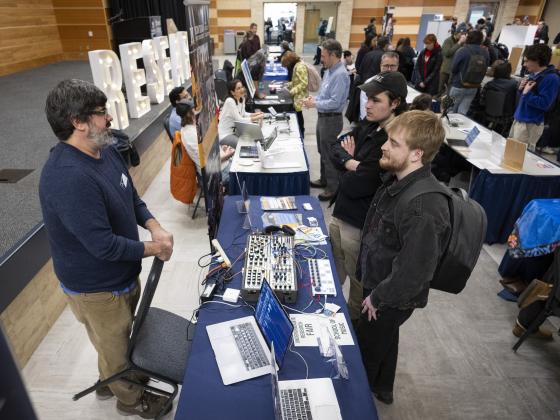BOZEMAN — Montana State University hosted its inaugural Undergraduate Research Fair on Monday, Jan. 22. The event, sponsored by MSU’s Office of Research and Economic Development, is designed to introduce students to on-campus research opportunities.
“The Undergraduate Research Fair is important as it makes opportunities to participate in research more accessible to all students,” said Alison Harmon, MSU vice president for research and economic development. “This is a chance for them to connect with faculty, research scientists and graduate students in person.”
Harmon co-developed the event with Amanda Haab, a junior majoring in microbiology. Haab is also MSU’s Undergraduate Research Ambassador for the Office of Research and Economic Development. A research ambassador, among other duties, convenes the Undergraduate Research Council, which was instrumental in planning and executing the Undergraduate Research Fair, Harmon said.
“Amanda Haab has been an impressive student leader and strong advocate for student research opportunities,” Harmon said. “The undergraduate research fair was her responsibility to envision, plan and implement—and she did a terrific job with this inaugural event for MSU.”
Haab judges the success of the event by the attendees’ experiences.
“MSU students have nearly unlimited access to world-renowned research faculty and facilities,” Haab said. “I hope participants found it to be a fun and informal way to be inspired by research and see that they, too, can become researchers.”
An estimated 200 undergraduates snaked their way through the 35 tables staffed by faculty and graduate students, stopping when a particular subject piqued their interests. Each table represented one of dozens of academic departments and research centers from across campus.
“I’m a freshman on a pre-med track,” said Evelyn Graham shortly after the start of the event. “This is a really cool opportunity. I love that MSU focuses so much on undergraduate research. This is really great.”
Sarah Codd, professor of mechanical and industrial engineering, hosted a table for the Montana Idea Network of Biomedical Research Excellence, or INBRE. Montana INBRE is a statewide network of higher education institutions that invests in biomedical research capacity and workforce pipeline. Codd said the relationship between undergraduate researchers, graduate students and lead researchers is mutually beneficial.
“Working with undergraduates enhances and completes the research lab community,” she said. “For the undergraduates, they get exposure to the world of research that influences them in ways they may not be expecting, and they further develop soft skills like writing, public speaking and networking. Therefore, the experience will help them find success in their careers whether or not they go to graduate school.”
Scott Monfort, associate professor of mechanical and industrial engineering with a research emphasis in musculoskeletal biomechanics, brought demonstrations of research equipment from his lab that measure human movement and brain activation, which he used to give mini presentations to attendees.
“Research can be a transformative experience in the undergraduate curriculum,” Monfort said. “It can expose students to real-world challenges and the search for solutions. Undergraduate research can also be enlightening in helping students identify which career fields they’re excited about.”
In addition to abridged research presentations and networking opportunities, the event featured music, raffles and refreshments.
Students filled out a survey at the end of their participation, “all of whom said they would recommend the fair to their peers in the future,” Haab said.

